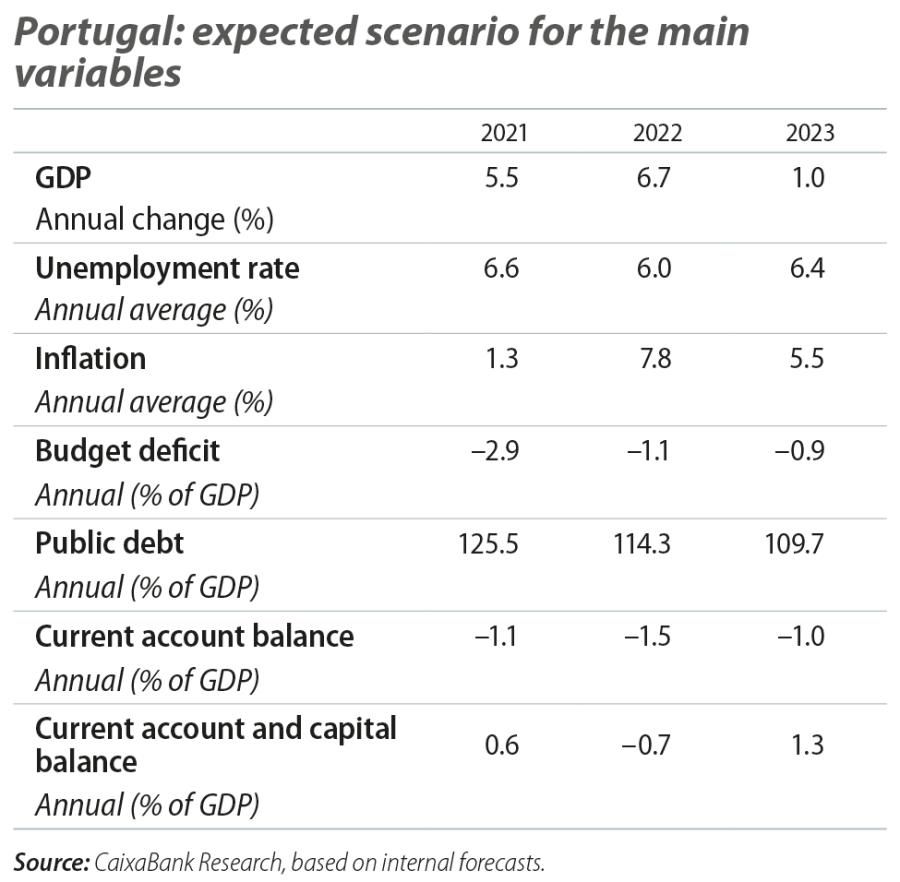Portugal’s new macroeconomic outlook
Since we last revised the economic forecasts for Portugal in September, some assumptions have changed and the new situation has led us to make a slight revision of our scenario, although the key underlying trends remain unchanged.

Since we last revised the economic forecasts for Portugal in September, some assumptions have changed. On the one hand, the European economies have avoided the contraction in economic activity that was expected in Q4 and energy prices have fallen substantially thanks to a mild winter and the good results of the energy policies agreed upon, among other factors. On the other hand, inflation has shown greater downward resistance than was expected, especially in the core inflation components, while short-term interest rates will rise more than we had initially anticipated (we now expect that in 2023 the 12-month Euribor will reach 3.6%, on average, instead of 2.7%). All this justifies a slight revision of our scenario, although the key underlying trends remain unchanged.

Economic activity has performed better than expected in recent months, and GDP managed to avoid a fall in Q4 2022, instead registering quarter-on-quarter growth of 0.2%. As such, for 2022 as a whole it registered growth of 6.7%, which is higher than the 6.3% we had anticipated and results in an upward base effect for the 2023 forecast.
The incorporation of this new information has led us to revise the expected growth for 2023 up to 1%. However, while the signals are less negative, the outlook for 2023 remains marked by restrictions which will limit the growth of demand. Thus, we can expect to see a significant moderation in household consumption as a result of the increase in interest rates, the persistence of high inflation and the loss of buoyancy in the labour market. Investment growth will also be lower than would be expected based on the receipt of the European funds, as a result of rising finance costs. The contribution from foreign demand, meanwhile, will gradually moderate as exports will feel the impact of weak demand among the main trading partners.
With regard to inflation, we expect a gradual correction during the course of 2023, although it will still remain high. The decline in energy prices will provide some relief, but it will not prevent the prices of other goods from continuing to reflect the transmission of rising production costs to final prices. In this scenario, we can expect inflation to remain above 5%; while a reduction compared to 2022, this is still well above the ECB’s 2% target.
In the public accounts, the trend has been very encouraging and has demonstrated the government’s determination to avoid an increase in the risk premiums demanded for Portuguese public debt. Prudent budgetary policy will continue, so we expect the reduction in the deficit and in the public debt ratio to continue, albeit at a slower pace due to the impact of the increase in the relative weight of debt servicing and a slowdown in revenues in line with the less buoyant economic activity.
As for the foreign sector, the current account and capital balance has returned to negative territory, registering foreign financing needs of 0.7% of GDP in 2022, as a result of the high price of the imports, especially energy, on which the country still very much depends. In 2023, we expect this situation to be corrected and to return to a positive foreign balance, thanks to the improvement in the capital balance due to the arrival of the European funds. However, the current account balance will remain negative, highlighting the need for measures to boost productivity and competitiveness relative to other economies.
As we have grown accustomed to in recent years, the macroeconomic outlook is fraught with uncertainty and 2023 is no exception. For now, the risks seem balanced, but the feeling that something could go wrong (again) has not faded entirely. Will we still experience a cold spell this winter in Europe that puts pressure on energy prices? Or could the relaxation of China’s zero-COVID policy push up energy prices? In this case, the pressure on prices would increase and inflation would be higher; the central bank would likely adopt more restrictive policies and consumption and investment would be further limited. Let us hope that this is not the case.
